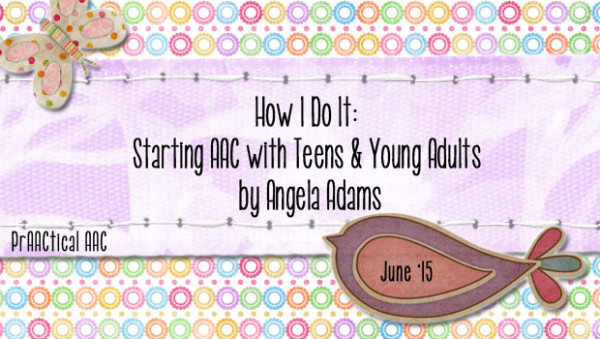How I Do It: Starting AAC with Teens & Young Adults by Angela Adams

Today, we welcome back Angela Adams, a Washington-based SLP. She currently works with students aged 11- 21 years in a small school district in the Pacific Northwest. Angela has 14 years experience, in both private practice and public school settings. She has a passion for helping adolescents and young adults with AAC needs develeop their communication skills. In this post, she shares some thoughts on getting older students started on AAC.
:::::::::::::::::::::::::::::::::::::::::::::::::::::::::::::::::::::::::::
What do you do when the new user of AAC is a teen or young adult?
Core vocabulary, phrase-based communication, category- and topic-based pages….so many options for the new AAC user.
THE CHALLENGES ARE REAL:
What happens when the new user is a teen or a young adult?
When in the public school system, what happens when this teen or young adult will only be our student 5 more years or 3 more or 1 more?
What about our new AAC users who are also English Language Learners?
What about our families who have limited experience with technology and struggle to help their teen or young adult?
AAC team members are faced with these questions…these challenges. Helping teens and young adult students gain access to communication is possible. Technology has grown exponentially in the last five years and many options… portable options…are now available for older clients. School-based AAC team members feel that time crunch…so much to teach the new AAC user and so little time.
SO…how do we help our teen and young adults feel successful when using their NEW AAC systems?
- Remember everyone will have different AAC needs and abilities
- Acknowledge teens and young adults may not have the most patience when learning an entirely new way to communicate. They may perceive the way they’ve used until now as being efficient.
- Give access to comments, questions and phrases on their favorite topics of interest.
- Don’t forget about core vocabulary.
- Allow multi-modal communication
- Picture this: 21 year old, using Proloquo for approximately 3 years, exclusively on own device for 2 years, English is the family’s second language — prior to Proloquo used a photo album and magazines to communicate wants — now has access to some core, some phrases and tons of vocabulary — loves to talk about animals, food, family and personal experiences: using a single word or 2 in Proloquo the student sets the conversation ‘topic’ and then uses facial expressions and gestures to expand on the topic
- Don’t feel the pressure of teaching EVERYTHING by the time they turn 21- focus on communication skills they can use beyond their school years.
- Consider where they will live and who will take care of them.
- Give access to quick phrases and comments that will allow them to direct their own care or request preferred items when communicating with new caregivers.
- If they have literacy skills, try an app or device that includes word-prediction.
- Will they have a job? Part-time job with a job coach?
- Give access to quick social phrases and comments that allows communication with fellow employees.
- Give access to, teach and model how they can communicate with their job coach.
- Allow their sense of humor to shine through when using their new language,
- Some students participate in person-centered planning meetings as they prepare to exit the school system.
- Focus on teaching them how to express their own thoughts, ideas and desires about their future.
- Believe they can do it!
- Have fun!
Filed under: PrAACtical Thinking
Tagged With: Angela Adams, teens
This post was written by Carole Zangari





1 Comment
Also consider the role of communication partner instruction… helping caregivers, job coaches, and friends learn to use the device and model language will continue the learning beyond the speech-language sessions.